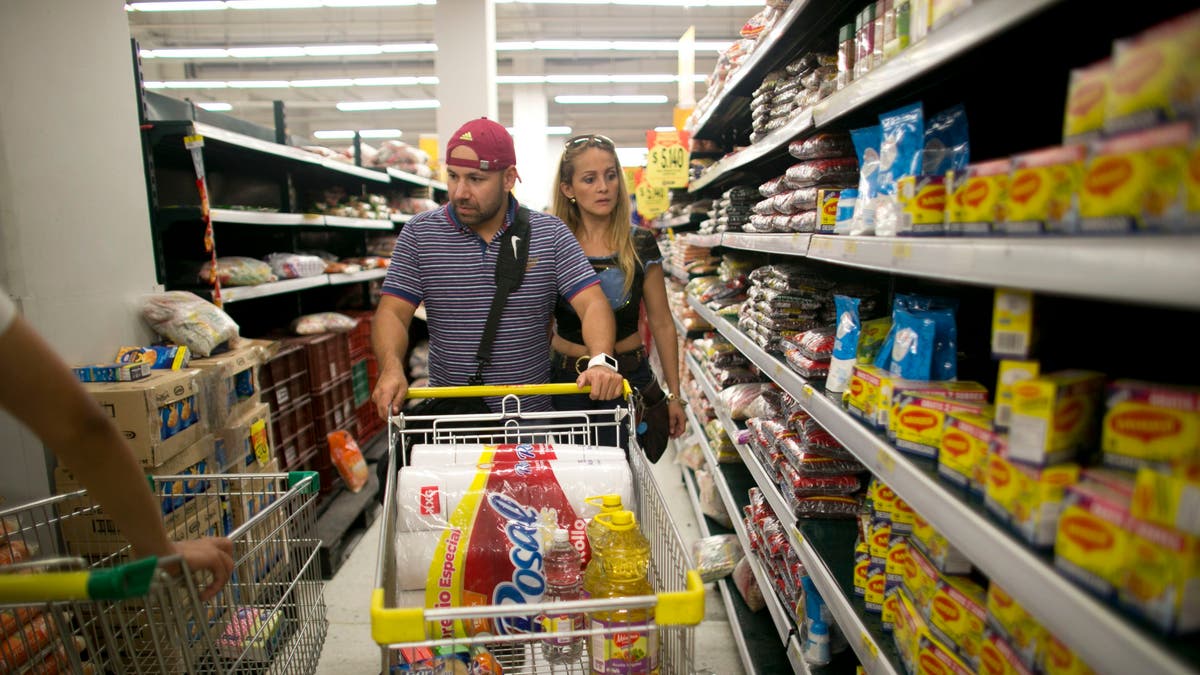
Ramiro and Tebie Gonzalez Ramirez shop for food in Cucuta, Colombia, Sunday, July 17, 2016. (ap)
Caracas, Venezuela – Colombia and Venezuela are said to be settling the final touches to reopening their border crossings, as Venezuelans eagerly await the green light to cross over for a few hours and purchase some of the products that are now luxury items in the socialist country — soap, sugar, toilet paper, wheat flour, sanitary towels for women.
Isis Vivas, a 64-year-old retired school teacher in the western state of Lara, will embark in a 12-hour drive to Cucuta as soon as the Simon Bolivar Bridge is cleared.
She said sugar and wheat to prepare arepas, a national food, are at the top of her shopping list.
Vivas is planning the trip with three lifelong friends: a former colleague and a tour bus driver for the last 10 years, a lawyer, and a Colombian with knowledge of the border area who will serve as guide.
“We plan to leave in the afternoon, arrive there in the morning and return at noon,” Vivas told Fox News Latino.
They are traveling on a 40-seat bus which they expect to fill out, at 13,000 bolivars for the roundtrip ride (around $13 at the current black market exchange rate).
All border crossings between the two countries were indefinitely shut down last year amid allegations of Colombian paramilitary hostilities against Venezuelan forces, added to the fact that according to Venezuelan officials the rampant smuggling of food and medicines from Colombia was partly to blame for the increasing scarcity.
Since Vivas and her friends posted the ad offering the grocery shopping trip on different social media sites earlier this week, the response has been overwhelming.
“I alone have received more than 150 calls of people interested in making the trip,” Vivas said.
“They also phoned from farther places from Cucuta, like Caracas, Valencia (Carabobo) or Maracay (Aragua),” referring to cities that are several hundreds of miles from the border.
“As long as they come to Barquisimeto, they can travel with us,” she added.
The retired teacher said they are not trying to make a profit nor take advantage of Venezuela’s current situation. They are just looking to help as many people as possible, she said.
“The 12,000 bolivars are to rent the bus and the rest is for a snack that we will hand out during the trip,” Vivas told FNL.
Twice this month – on July 10, and July 16-17 – authorities opened the Simon Bolivar crossing and adding both occasions some 180,000 Venezuelans crossed it to buy food, medicines and other basic goods.
On July 17, 53-year-old Luz Marina Uribe made a one-and-a-half-hour trip from San Cristobal, Tachira, to look for her blood pressure medicine.
“In the last three months I had to take garlic and other natural remedies,” she said.
While Colombia has become the new popular destination for understocked Venezuelans, it is not the first. For months now, upper-class Venezuelans have been traveling to Aruba and other countries nearby to buy products.
But the plane tickets are expensive and just a small fraction of the people can buy them.
Colombia is now emerging as the option for the middle class.
“I bought 24 toilet paper rolls for 8,500 bolivars ($8.50), three liters of oil for 4,500 ($4.50) and one kilogram of sugar for 1,600 ($1.60). That’s half the price of bachaqueros (illegal resellers) in Venezuela,” Uribe told FNL.
Just in those three products she spent almost 15,000 bolivars, which is Venezuela’s monthly minimum wage.
She said her situation is sometimes beyond pressing: her job doesn’t allow her to spend an entire day in the food lines, but she doesn’t have enough money either to pay bachaqueros either.
So for someone like her who lives not far from the border, Colombia is a life saver.
It’s not the case for people from lower classes, who can’t afford market prices and will only eat if they get lucky in long lines for subsidized food or the government provides them with monthly food allocations.
